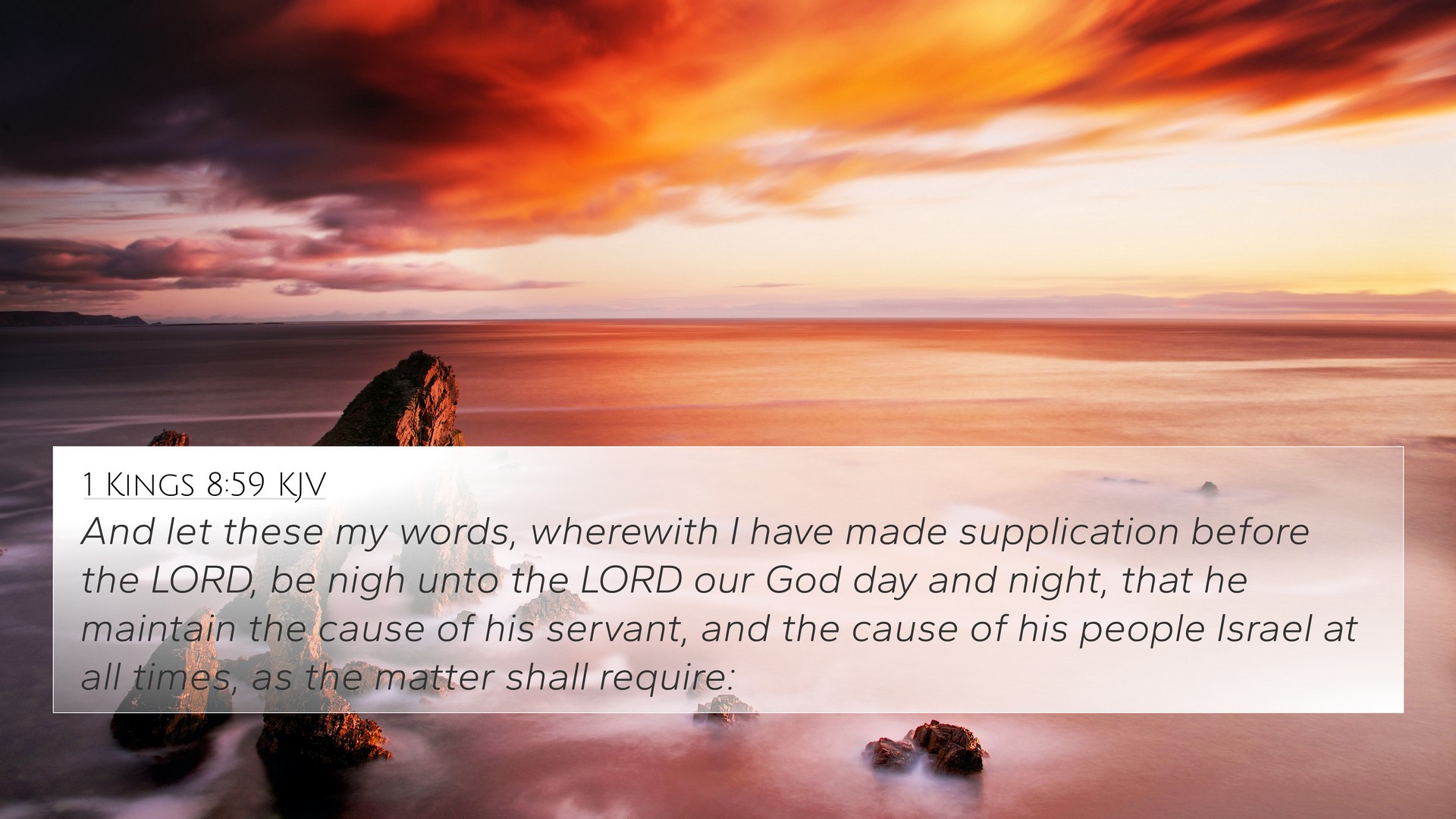Understanding 1 Kings 8:59
1 Kings 8:59 states: “And let these words of mine, with which I have made supplication before the Lord, be near to the Lord our God day and night, that He may maintain the cause of His servant and the cause of His people Israel, as each day requires.”
Verse Meaning Summary
This verse encapsulates Solomon's heartfelt prayer during the dedication of the temple. The essence of the verse lies in the appeal for continual divine attention and support for both the king and the nation of Israel.
- Prayer and Supplication: Solomon emphasizes the importance of constant communication with God, indicating that prayer should be an ongoing practice.
- Divine Attention: The request for God to keep His words and intentions close reflects a deep desire for divine oversight.
- Responsibility and Accountability: Solomon recognizes his role as king and the need for God's guidance to fulfill that role adequately.
- Collective National Need: The mention of all of Israel underscores that divine favor is crucial not just for the ruler but for the entire nation.
Thematic Connections
This verse creates bridges to numerous other scriptures, aligning the themes of prayer, divine guidance, and national identity.
Cross-References
- 2 Chronicles 6:19: A parallel verse that highlights God's attention to Solomon's prayers.
- Psalm 34:15: The Lord's eyes being upon the righteous reflects the assurance of divine attention.
- Matthew 7:7: Jesus' teaching on asking, seeking, and knocking ties to persistent prayer.
- 1 Peter 3:12: This verse echoes the notion that the Lord watches over the righteous and their supplications.
- James 5:16: The power of prayer being emphasized, resonating with Solomon’s request for divine maintenance.
- Philippians 4:6: This verse encourages believers to be anxious for nothing, instead making their requests known to God.
- 1 Chronicles 28:9: Solomonic wisdom in seeking God with a loyal heart for guidance and support.
Interpretation Insights
Public domain commentaries provide additional layers to the understanding of this verse:
- Matthew Henry's Commentary: He elaborates that Solomon’s heartfelt plea highlights the necessity of God’s presence in the governance of Israel, portraying prayer as essential for civil authority.
- Albert Barnes' Notes: Barnes points to God’s faithfulness in answering prayers, emphasizing the significance of Solomon’s words being perpetually before God for the well-being of the nation.
- Adam Clarke's Commentary: Clarke notes the perpetual intercession that Solomon seeks, framing it within the broader context of the covenant relationship between God and Israel.
Cross-Referencing Insights
Utilizing tools for scripture cross-referencing can enhance the understanding of 1 Kings 8:59. Here are suggestions and methods:
- Bible Concordance: Utilize a Bible concordance to locate similar themes related to prayer and divine guidance across scriptures.
- Bible Cross-Reference Guide: Employ a cross-reference guide to see connections across Old and New Testament verses concerning the faithfulness of God to His people.
- Cross-Referencing Study Methods: Engage in comparative studies of various verses to understand the consistency of God’s promises.
- Bible Chain References: Create a chain of references that connect 1 Kings 8:59 with other scriptures that highlight God’s attentiveness to prayer.
Practical Application
For those seeking deeper engagement with scripture, consider how to find relevant cross-references effectively:
- Identify Connections: Look for thematic links between 1 Kings 8:59 and other verses about prayer and divine support.
- Comparative Studies: Engage in detailed comparative studies focusing on themes of prayer in both Old and New Testaments.
- Application to Life: Reflect on the essence of continual prayer in one’s life, drawing parallels from Solomon’s plea to personal circumstances.
Conclusion
The verse 1 Kings 8:59 serves as a powerful reminder of the necessity of persistent prayer in the life of a believer and the importance of God’s guidance in leadership and community. By cross-referencing with related scriptures, we can enrich our understanding and application of this vital biblical principle.









